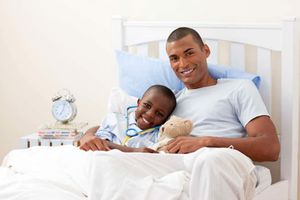Was your baby born with a birth defect? How to cope and build a support system

Over 240,000 newborn babies die across the world within the first 28 days of birth every year due to birth defects.
What you need to know:
- 9 out of 10 children who are born with a serious birth defect are in low and middle-income countries.
- The most common and severe birth defects affecting babies are heart defects, neural tube defects, and Down Syndrome.
- Birth defects have become a larger proportion of the cause of neonatal deaths and deaths of babies under the age of five years
Birth defects are one of the most prevalent health conditions that affect babies. According to the World Health Organization (WHO), over 240,000 newborn babies die across the world within the first 28 days of birth every year due to birth defects.
Also known as congenital abnormalities, the WHO says birth defects cause an additional 170 000 deaths of children between the ages of 1 month and 5 years. The impacts of birth defects go beyond the baby’s condition. Parents of babies with congenital conditions are more prone to suffer from mental health challenges. According to the WHO, parents may exhibit symptoms of post-traumatic stress disorder (PTSD), anxiety, and depression. These will mainly centre on concerns over whether the baby will survive, the kind of life they will have, and if they will be able to develop physically and mentally like any other child.
These fears have in certain instances led to neglect of babies born with birth defects. Beyond the health challenges babies born with congenital abnormalities face in their development, they also have to contend with abuse both at the family and community level. A seven-year examination of cases of birth defects in 3 million children in the United States that began in 2002 found that babies who have malformations of the mouth and jaw which are known as cleft lip and palate are nearly twice as likely to be abused by their second birthday than children born without any of these defects. Babies who are born with spina bifida are nearly two-thirds more likely to be abused and mistreated than children born without this condition. The only babies with birth defects who were found to be less likely to be mistreated in comparison to babies born without birth defects were babies born with Down syndrome. Among the maltreated children, the infants with cleft lip and palate or spina bifida were about two to three times more likely to experience abuse in their first month of life.
This examination of how society perceives congenital abnormalities in children was carried out by the Children's Learning Institute at the University of Texas Health Science Centre in Houston. The examination also found the burden of parenting is heavier for parents of children with congenital abnormalities. "Parenting is challenging - even for typically developing children in well-resourced homes. However, the medical complications of birth defects like spina bifida or cleft lip or cleft palate add another level of stress and complexity to infant care," the examination report that appeared in the journal Paediatrics said.
The most prominent forms of abuse children with congenital abnormalities are subjected to include physical abuse, physical neglect, medical neglect, general neglect of the baby, and lack of supervision.
According to Sanford Children’s Health, if a baby is born with a congenital abnormality and is exposed to a lack of medical care and physical abuse, they will be at risk of developing a myriad of complications which may include:
- Heart problems
- Intestinal problems
- Vision problems
- Hearing problems
- Thyroid problems
- Learning problems
- Middle ear infections
- Diabetes
- High blood pressure
- Severe infections
- Chronic lung disease
- Autism
- Attention-deficit/hyperactivity disorder (ADHD)
- Obsessive-compulsive disorder (OCD)
- Anxiety
***
How you and your baby cope with a congenital abnormality will largely depend on the steps you take. These steps could be abusive, negligent, and harmful to the baby or they could be proactive and beneficial to the baby’s general well-being and your mental and emotional wellness. Sanford Children’s Health recommends the following:
- Keep all the appointments that your pediatrician has set for you. You should also know which other health experts your child will be seeing and how their input will help your baby. These may include neuro specialists, dietitians, physical therapists, speech therapists, and psychological counselors for you.
- Arrange for health insurance to help you ease the financial costs that come with raising a baby who needs special care and treatment.
- Have your health specialists on speed dial in the event of an emergency.
- Consider having genetic testing and counseling to understand your risk, and the probability of future birth defects if you plan on having more kids.
- Talk to your family, relatives, friends, and your friendly immediate neighbours about your baby’s condition to create awareness and nip any misconceptions and stigma in the bud.
Quick Stats
According to the World Health Organization:
- 9 out of 10 children who are born with a serious birth defect are in low and middle-income countries.
- The most common and severe birth defects affecting babies are heart defects, neural tube defects, and Down Syndrome.
- Birth defects have become a larger proportion of the cause of neonatal deaths and deaths of babies under the age of five years even as death rates among children under the age of five continue to decline.





